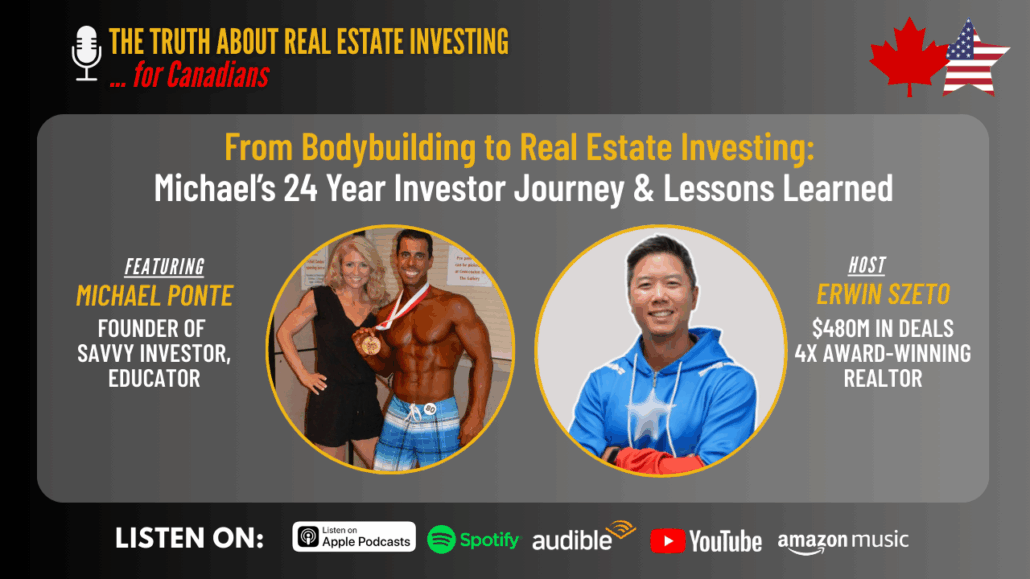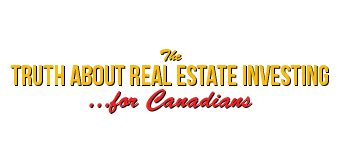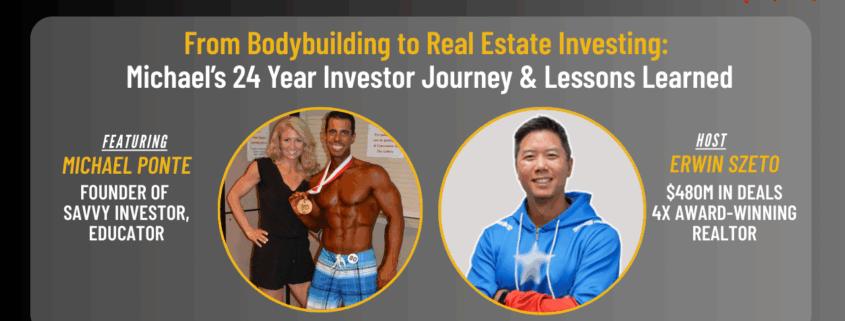From Townhomes to Development: Michael Ponte’s Contrarian Take on Real Estate Investing

Recorded: August 2025
Guest: Michael Ponte, the Founder of Savvy Investor
Host: Erwin Szeto, The Truth About Real Estate Investing for Canadians Podcast
Welcome back to another episode of “The Truth About Real Estate Investing for Canadians.” On this episode, I had the pleasure of welcoming back a four-time guest, my friend and seasoned investor, Michael Ponte. In our chat, he shared his perspective on how real estate investing has changed, his unique take on CMHC MLI Select financing, and the surprising connection between bodybuilding and disciplined investing.
The Evolution of Real Estate Investing
I’ve been in this game for a while, and it’s fascinating to see how the landscape has changed. Michael’s story is a great example. He started back in 2001 with a simple townhome in Edmonton, bought for just $78,000. It was an affordable entry point that offered solid cash flow. But as we discussed, those days are largely gone. That same property is now pushing $300,000, and the rent just hasn’t kept up. As Michael pointed out, the game has shifted. To make a deal work in today’s market, you often need to look at more complex strategies like development and intensive renovations.
A Contrarian View on CMHC MLI Select
In our community, CMHC MLI Select financing has a lot of buzz. But Michael offered a compelling counterpoint. He’s cautious about the trend of overleveraging and relying on government-backed financing to justify what he sees as overpriced deals. His concern is that many of these projects are priced at the very top of the market, leaving little room for error or a way to add value. He stressed that he still believes in the fundamental rule of “making your money on the buy” and prefers to focus on older multifamily properties where he can create value through smart renovations and operational improvements.
Bodybuilding and Real Estate: A Discipline-Driven Parallel
One of the most powerful moments of our conversation was when Michael opened up about his bodybuilding journey. After a serious health scare, he committed to an intense training and nutrition regimen, which led him to place in the top five in multiple competitions. He drew a brilliant parallel between the discipline, sacrifice, and mindset required for bodybuilding and what it takes to succeed in real estate. The lesson? Success isn’t about chasing the next shiny object; it’s about consistency and long-term discipline.
Key Takeaways
Real estate investing has moved beyond simple buy-and-hold strategies to require more complex development and value-add approaches.
- CMHC MLI Select financing can be risky if used to justify a bad deal.
- Discipline and long-term thinking are critical for success in both investing and life.
- Treat your real estate ventures like a business with systems and a focus on scalability.
- Stability and time are more valuable than chasing quick, flashy opportunities.
Bonus: Savvy Investor Summit
Bonus: Savvy Investor Summit
Before we wrapped up, Michael gave us a sneak peek into the upcoming Savvy Investor Summit, a free two-day virtual conference happening on September 13–14, 2025. It sounds incredible, with speed networking, an exhibitor hall, and over $10,000 in prizes, including a Caribbean cruise for two.
To find out more and register for the event, head over to: https://thesavvyinvestor.ca
Join Cherry Chan and me at the WEALTH SUMMIT 2025 on Saturday morning, September 27th, 2025. Seating is extremely limited, so block off your calendar now. We’ll also be broadcasting the event as a webinar. And yes—lunch is sponsored, so you can stick around and network with fellow investors. Save a spot for yourself now
Real Estate Investing in 2025: Contrarian Insights from Michael Ponte
1. What is CMHC MLI Select, and why is it controversial among Canadian real estate investors?
CMHC MLI Select is a multifamily mortgage financing program offering high leverage and long amortization for apartment developments. Michael Ponte cautions that many investors rely on it to justify overpriced deals, increasing financing risk if market conditions shift.
2. Why are townhomes no longer a strong investment in the Canadian real estate market?
Townhomes that once offered solid cash flow now suffer from poor rental yields. Prices have surged while rents lag, collapsing the cash flow ratio and making them less viable for new real estate investors.
3. How has Canadian real estate investing evolved over the past two decades?
Investing has shifted from affordable townhomes to large-scale development projects and multifamily conversions. Michael Ponte emphasizes the need for adaptability and a disciplined investing mindset.
4. What are the risks of overleveraging in real estate development?
Overleveraging increases debt exposure and financing risk, especially in volatile markets. Michael warns that relying on aggressive financing structures can leave investors vulnerable to interest rate hikes and market corrections.
5. How does bodybuilding relate to real estate investor discipline?
Michael Ponte’s experience as a competitive bodybuilder taught him the value of consistency, sacrifice, and mental toughness. These traits directly translate to disciplined real estate investing and long-term success.
6. What is the Savvy Investor Summit, and who should attend?
The Savvy Investor Summit is a free Canadian real estate conference happening September 13–14, 2025. It’s designed for investors seeking business systems, networking, and expert insights across multifamily, development, and property management.
7. How can investors identify low ROI properties in their portfolio?
Michael recommends reviewing your portfolio for properties with poor cash flow or high management demands. Selling these underperforming assets can free up time and capital for stronger investments.
8. Why does Michael Ponte prefer older multifamily buildings over new developments?
Older multifamily properties offer better value-add opportunities through renovations and operational improvements. Michael believes they provide stronger returns and lower risk than high-priced new builds.
9. What mindset mistakes do new real estate investors often make?
New real estate investors often chase door count or flashy strategies without understanding business fundamentals. Michael stresses the importance of systems, scalability, and treating real estate as a long-term business.
10. Is the Canadian real estate market still viable for investors in 2025?
Yes, but strategies must evolve. Michael advises focusing on fundamentals, avoiding hype, and adapting to changing conditions in the Canadian real estate market in 2025.
🎧 Listen to the full episode here
📜 Full Transcript
The full, cleaned-up transcript from my conversation with Michael is available here for anyone who wants to dive deeper into the nuances of protecting themselves as an Ontario landlord and building a stress-free investment portfolio.
To Listen:
On Spotify: https://open.spotify.com/episode/1gkYYhLHSFDZZr6ddVsnxM?si=4GA2cXr2QNeoC21mpARscA
YouTube: https://youtu.be/4o4Vo0RVZ7w
🦸♂️Household Hero? Here’s Your Next Step
If you’re a Canadian investor trying to build wealth safely and sustainably, Adam’s journey has valuable takeaways.
It might be time to revisit your current strategies—real estate, lending, or insurance—and ask:
- Do your investments match your long-term goals?
- Do you fully understand how your strategies work?
- Would a more conservative approach offer better peace of mind?
Real estate remains a powerful tool for building wealth, especially with careful underwriting and due diligence. Insurance can be useful too—but only if it supports your broader financial goals.
Need help with conservative, peace-of-mind investing—backed by Wall Street-style due diligence—plus financial planning with your best interests at heart?
Until next time, happy Canadian and USA Real Estate Investing.
Erwin Szeto,
Your Cross Border Investment Guy
Why I’m Investing in the U.S.
I’ve been investing in Ontario since 2005. It’s been a great run—starting with properties in the $100Ks, now reaching $800K–$1M. How much higher can it go? I don’t know.
The remaining appreciation potential doesn’t justify the risk. That’s why I advise clients to look to the U.S., where rental properties range from $150K–$350K USD, with rents between $1,400–$2,600/month.
These cash-flowing numbers are night and day compared to Canada. Plus, landlords have rights, there’s no rent control, and income is in U.S. dollars—which are stronger than Canadian dollars.
If you don’t believe that U.S. dollars are stronger, ask 100 non-Canadians what they’d prefer to be paid in.
To regain control of your retirement, check out the cash-flow properties at:
👉 iwin.sharesfr.com
How SHARE Makes It Easier
The best part? My U.S. investments are more passive than my Canadian ones. I work with SHARE, an asset manager that guides me through the entire process.
SHARE helps with:
- Finding quality income properties
- Structuring the legal and tax side
- Managing the property manager and insurance provider
- Saving time and money with preferred rates
They even advise on when to refinance or sell. SHARE supports investors across the U.S., which is why I plan to own in Tennessee, Georgia, and Texas. It’s like having a JV partner—without giving up ownership or control.
Final Thoughts
If increasing cash flow is your goal, I don’t know of a better strategy for most Canadians. Once more: iwin.sharesfr.com is where to see what boring, cash-flowing investing looks like on the path to financial peace.
This is how I’m making real estate investing great again—for my family and hopefully for yours too.
Sponsored by… Me!
This episode isn’t sponsored—except by my wife Cherry and me. Real estate investing is our life. It’s helped us build wealth and achieve peace of mind about retirement and our children’s future.
Interested in our systematic approach to real estate investing—the same one used by most of my podcast guests? Then check out:
📍 infinitywealth.ca/events
Till next time—just do it. I believe in you.
Erwin Szeto
W: erwinszeto.com
FB: facebook.com/erwin.szeto
IG: @erwinszeto
Disclaimer
As a committed advocate for transparent and responsible investing, I want to disclose that I am an Advisor to SHARE SFR (Single Family Rental). I hold equity in the company and earn referral commissions from clients I refer.
My endorsement of their model—focusing on positive cash flow and direct ownership—is based on personal experience and belief. Still, every investor should do their own due diligence.




Leave a Reply
Want to join the discussion?Feel free to contribute!